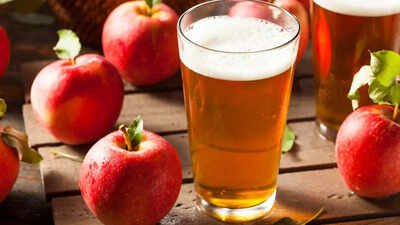ARTICLE AD BOX

Apple juice is a widely enjoyed, naturally sweet drink rich in vitamins and minerals. Despite its benefits, concerns about oral health arise due to its acidity and sugar content.
Recent research reveals that while apple juice can temporarily disrupt saliva, the mouth’s protective barrier, these effects are short-lived, with saliva quickly restoring its protective function. Occasional consumption is therefore unlikely to cause lasting harm. However, frequent or prolonged intake may overwhelm saliva’s repair mechanisms, potentially leading to enamel erosion, increased cavity risk, and temporary reductions in oral immune function.
Moderation and proper oral hygiene are key to safe consumption.
How apple juice interacts with saliva to protect your oral health
Saliva is essential for maintaining oral health. It lubricates the mouth, washes away food particles, reduces friction, and helps repair early enamel damage. Key proteins in saliva, such as mucins, immunoglobulins, cystatins, and carbonic anhydrase, play vital roles in protection and lubrication. These proteins help form a slippery film that neutralises acids and shields teeth from bacteria and decay.
In a controlled study published in PLOSOne, participants rinsed their mouths with apple juice for one minute, followed by similar tests with tap water. Key findings include:
- Temporary disruption: Apple juice briefly affected saliva’s lubricating properties, but full recovery occurred within 10 minutes.
- Protein changes: Immunoglobulins, cystatins, and carbonic anhydrase decreased slightly after exposure, while mucins, the main lubricating proteins, remained stable.
- Unexpected water effect: Tap water initially caused greater disruption to saliva than apple juice, likely due to its mineral content interfering with mucins.
These findings indicate that occasional apple juice consumption is not inherently damaging, thanks to saliva’s rapid repair mechanisms. However, frequent or prolonged intake of apple juice, especially throughout the day, may increase the risk of enamel erosion and cavities, making moderation and proper oral hygiene essential.
Apple juice effects on oral health: Tooth enamel, cavities, and immune function
While brief exposure is generally safe, frequent or prolonged sipping can pose risks:1. Tooth enamel erosionFrequent consumption of acidic drinks like apple juice can wear down tooth enamel, leading to sensitivity and increasing the risk of decay, discolouration, and structural damage. Poor oral hygiene worsens this effect, so moderation and protective measures like rinsing with water or using a straw are important.2. Increased cavity riskApple juice’s natural sugars feed oral bacteria, producing acids that attack enamel and form plaque.
Frequent sipping can overwhelm saliva’s repair mechanisms, increasing cavity risk, gum inflammation, and bad breath. Limiting intake and maintaining oral hygiene helps reduce these risks.3. Oral immune functionApple juice can temporarily lower saliva proteins that support oral immunity, slightly weakening the mouth’s defence against bacteria. Repeated exposure may disrupt the oral microbiome, making teeth and gums more vulnerable.
Staying hydrated and practising good oral care helps maintain strong oral immunity.
Tips for safer apple juice consumption
To protect your teeth while enjoying apple juice:
- Drink quickly: Consume apple juice in one sitting rather than sipping throughout the day.
- Rinse with water: Wash away lingering sugars and acids immediately after drinking.
- Use a straw: Minimise contact between acidic juice and teeth.
- Allow recovery time: Wait between drinks to let saliva restore protection.
- Moderation: Limit daily intake to reduce the risk of long-term enamel erosion and cavities.
Disclaimer: This article is for informational purposes only and does not constitute medical advice. Always consult a qualified healthcare professional before making any changes to your health routine or treatment.Also read | This added sugar in processed food could be fueling cancer cells: Study



.png)
.png)
.png)
















 6 days ago
8
6 days ago
8







 English (US) ·
English (US) ·